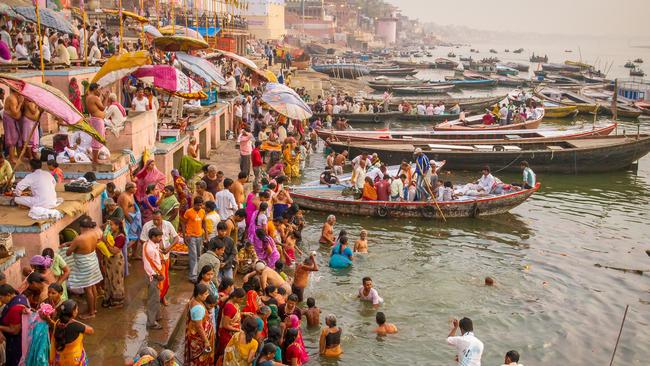Truth, rage and despair
Madhuri Vijay’s debut novel taps into an Indian rage well known to VS Naipal.

Trinidadian-born author VS Naipaul often wrote unkindly of India. He could not bear the psychological assault of the sheer mass of humanity to be found there, nor could he tolerate the poverty he encountered during his travels — the squalor and collective resignation to circumstance that flowed from it.
Naipaul’s insights into India, sourly yet compulsively notated in books such as An Area of Darkness and A Million Mutinies Now, can seem dated today, at a moment when the subcontinent has emerged as a global power, confident and energetic. Still, there were times when Naipaul’s jaundiced eye latched on to something troubling and deep.
“To awaken to history was to cease to live instinctively,” he wrote in 1992, referring to India’s postcolonial experience. “It was to begin to see oneself and one’s group the way the outside world saw one; and it was to know a kind of rage. India was now full of this rage. There had been a general awakening. But everyone awakened first to his own group or community; every group thought itself unique in its awakening; and every group sought to separate its rage from the rage of other groups.”
The debut novel of Madhuri Vijay, who was born and raised in Bangalore and is now based in America, takes this rage, with all the violence and terror occasioned by it, and fashions a bleak and fiercely intelligent story from the awakening Naipaul describes.
She does so by mapping the coming of age of one young, privileged, middle-class woman from Bangalore on to the ongoing calamity of Kashmir — that beautiful, benighted region that India and Pakistan, Hindu and Muslim, have been struggling over since partition.
In one sense, Vijay’s narrative could take place anywhere. The story of Shalini, clever and watchful single child of a couple who love their daughter deeply while fighting a pitched domestic battle at home, is told in the weary, jaded tones of globalised urban youth.

When Shalini’s mother dies in the early 2000s after years of mental illness (though the author is at pains to insist we should be careful to ascribe medicalised notions of damage or deficit to a woman so often full of wit and vivacity, so markedly allergic to cant), the girl is bereft. Her businessman father, a kindly and straightforward figure, has always been her rock. Yet it is the powerfully ambivalent relationship with her mother that formed her.
Grief manifests as ennui. Shalini takes on a class-appropriate job at an NGO, goes through the social motions, but feels empty as a drum. Instead she grows obsessed with the memory of a man, a modest clothes peddler from the disputed Kashmir region who, years before, was a regular visitor to their suburban home. She has always known that there existed some bond between her wild, droll, vivid mother and the handsome man from another caste, religion, and, indeed, world.
The Far Field is the story of Shalini’s decision to go travelling in search of Bashir Ahmed, the only one to reach otherwise inaccessible parts of her lost parent. All she has to go on is a story he told her when she was a child, about a miraculous occurrence in the town where his wife’s family lived: Kishtwar, in the south of Kashmir, six thousand feet above sea level, its population split almost evenly between Hindus and Muslims. “The slimmest of clues,” thinks Shalini, “but it is was enough.”
This is the point at which the novel departs, not just from Westernised space, but from the comfortable ambit of many Western narratives. Shalini, Indian by birth and upbringing, nonetheless finds herself in a place that could be on the dark side of the moon. She arrives in Kishtwar with a single backpack and an envelope bulging with rupees: a closed, defensive figure, unforgiving towards herself and others who reach out to her.
“I sat with my head held high, tasting bitter pride in my own weakness, and hating myself, because, cynical and hardened as I believed myself to be at twenty four, I had never stopped to consider that pity might, in fact, be just another facet of love.”
What Shalini encounters in the mountains of Kashmir undoes this carefully cultivated posture. The people she meets there don’t have the luxury of cynicism: they are too busy simply surviving. When, after some searching, the young woman finally contacts the family of Bashir Ahmed, only to find that he died — disappeared by the Indian army, apparently for aiding Islamist militants — she is stumped.
Her determination to find out what happened to him is matched only by her uncertainty about what to do once she does. But this sad intelligence is just the beginning of Shalini’s time in the region, staying on with Bashir Ahmed’s family. Through them, she gains an alternative education in the satisfactions of a life lived on more rudimentary terms.
What Shalini gets from immersion in village existence, based in a region whose natural beauty only partly obscures periods of low-level warfare that incriminate everyone, even those who simply wish to live in peace and co-religious harmony, is a misplaced sense of calm: a feeling that here, finally, she has found a family and a way of living that counts.
That she has not learned enough, or been careful enough in her actions, is the final and most bitter lesson: which is especially tragic, since nothing in her life has trained her to penetrate the darkness that has descended upon the inhabitants of the region. She has no sense of what it is to live inside the maelstroms of Indian history rather than at their calm, pacific edge.
This lacuna in her political understanding is told through a twinned narrative that explores Shalini’s early life — exploring from within both her troubled, agonised relationship with her mother and the woman’s strange, destructive obsession with Bashir Ahmed. These chapters are crafted so as to clarify much that has been left intentionally obscure.
Vijay’s novel concludes with a series of shocks that unmoor Shalini from her half-formed understanding of Kashmir and its people — a wisdom that comes too late to help anyone. There is a Naipaulian bitterness to these pages, a mature vision that belies the relative youth of its author, though Vijay departs from Naipaul in one significant respect.
She acknowledges, with unblinking accuracy, the cruel pressures that politics has impressed upon so many in India’s postcolonial era, the rages it has inspired, the deformations it has wrought.
But she never allows that knowledge to dislodge a profound sense of the human decency, courage and care that stands against them.
Geordie Williamson is chief literary critic of The Australian.
The Far Field
By Madhuri Vijay
Grove Press, 448pp, $29.99




To join the conversation, please log in. Don't have an account? Register
Join the conversation, you are commenting as Logout